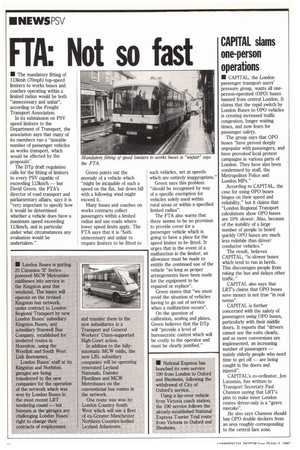FTA: Not so fast
Page 20

If you've noticed an error in this article please click here to report it so we can fix it.
• The mandatory fitting of 113kmh (70mph) top-speed limiters to works buses and coaches operating within a limited radius would be both "unnecessary and unfair", according to the Freight Transport Association.
In its submission on PSV speed limiters to the Department of Transport, the association says that many of its members run a "sizeable number of passenger vehicles as works transport, which would be affected by the proposals".
The DTp draft regulation calls for the fitting of limiters to every PSV capable of exceeding 1131un/h — but David Green, the FTA's director of road transport and parliamentary affairs, says it is "very important to specify how it would be determined whether a vehicle does have a maximum speed exceeding 1131cm/h, and in particular under what circumstances any evaluation would be undertaken." Green points out the anomaly of a vehicle which "might be incapable of such a speed on the flat, but down hill with a following wind might exceed it.
Many buses and coaches on works contracts collect passengers within a limited radius and use roads where lower speed limits apply. The FTA says that it is "both unnecessary and unfair to require limiters to be fitted to such vehicles, set at speeds which are entirely inappropriate."
Green says this problem "should be recognised by way of a specific exemption for vehicles solely used within rural areas or within a specified limited radius".
The FTA also warns that there seems to be no provision to provide cover for a passenger vehicle which is going to have a place for the speed limiter to be fitted. It urges that in the event of a malfunction in the limiter, an allowance must be made to entitle the continued use of the vehicle "so long as proper arrangements have been made for the equipment to be repaired or replace".
Green states that "we must avoid the situation of vehicles having to go out of service when a malfunction occurs".
On the question of calibration, sealing and plates, Green believes that the DTp will "provide a level of bureaucratic control which will be costly to the operator and must be clearly justified."




















































































































































